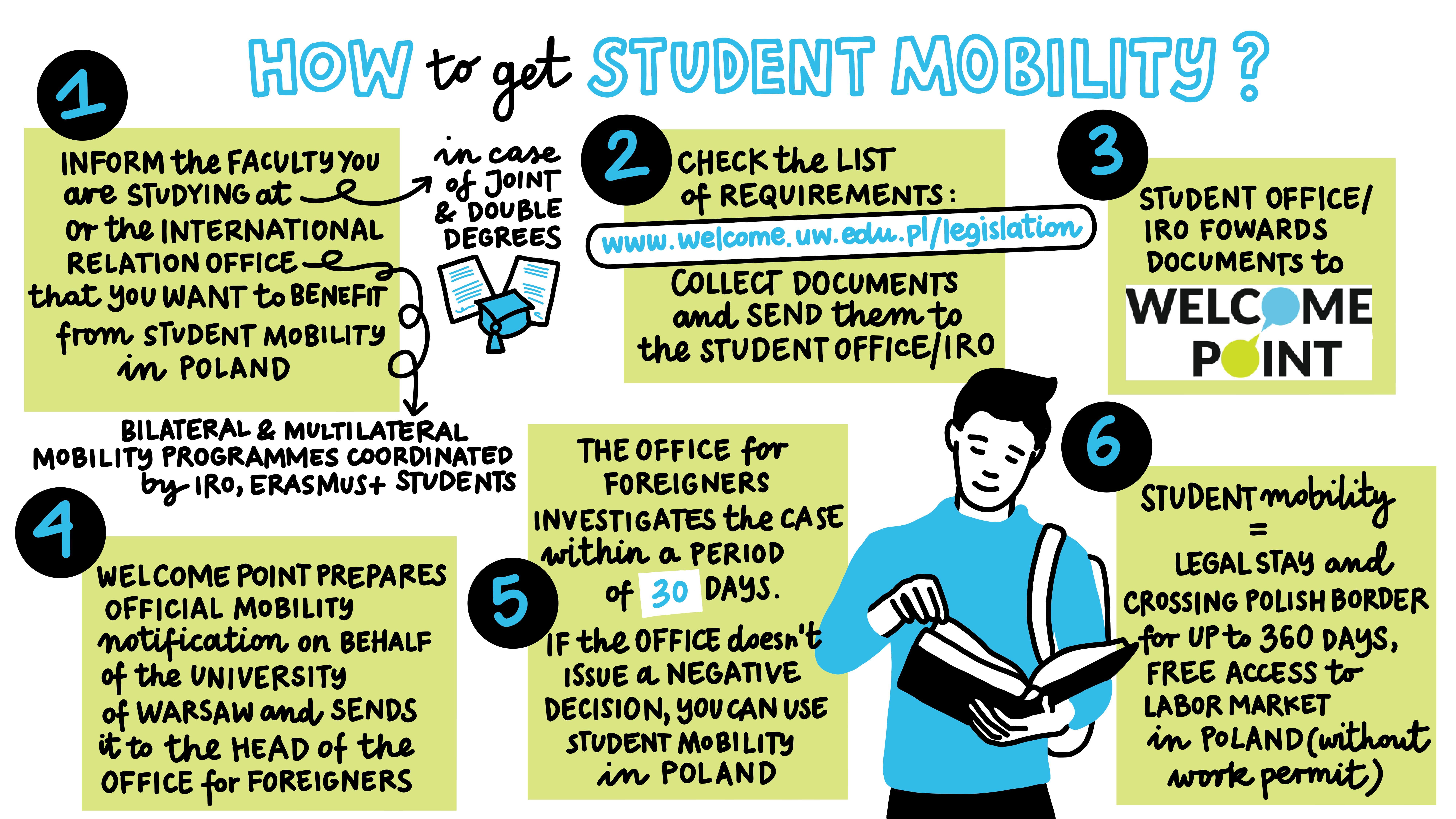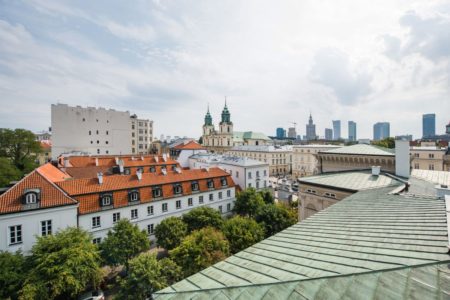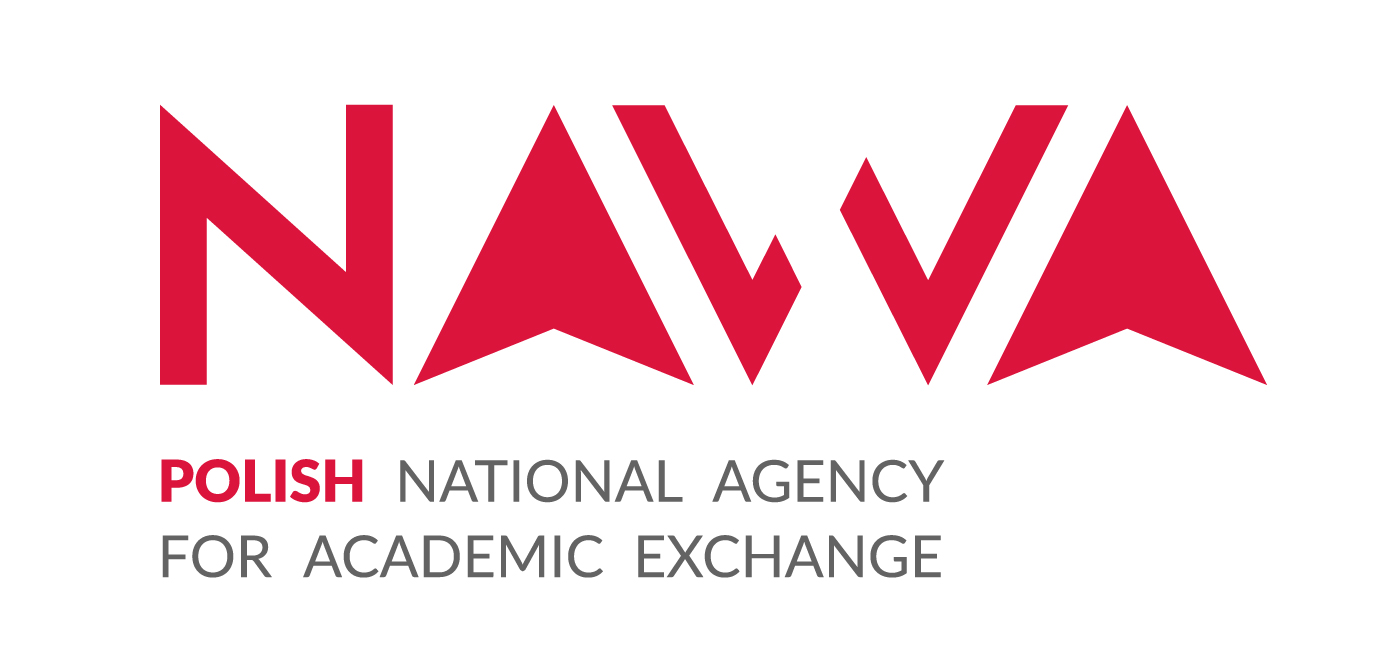Mobility allows full-time students to stay in Poland legally without applying for a Polish residence permit for a period not exceeding 360 days. 

Who can apply for student mobility in Poland?
You can apply for student mobility in Poland if you are a full-time non-EU student or doctoral student, participating in an EU mobility programme, or a multilateral programme, for example:
- Erasmus+,
- CEEPUS,
- NOHA,
- joint or double degrees.
Requirements:
1) Students and doctoral students should hold a residence permit or long-term visa issued by another EU Member State** (excluding Ireland and Denmark) with the “STUDENT” annotation, valid for the whole mobility period in Poland.
** Independently of being a member of Schengen zone
2) For the period of waiting for the completion of the mobility procedure, the student stays in Poland legally, i.e. their stay did not exceed the limit of 90/180 days of short-term mobility in the Schengen area. There is a calculator students can use as a tool to keep an eye on the 90/180-day period.
3) To apply for student mobility, the student should inform the Faculty they are studying at (in case of joint and double degrees) or the International Relations Office (bilateral and multilateral mobility programmes coordinated by IRO, Erasmus+ students).
Required documents:
1) A copy of a visa or residence permit issued by another EU member state** (excluding Ireland and Denmark) with the annotation “STUDENT” valid for the whole mobility period in Poland
** Independently of being a member of Schengen zone
2) A copy of the student’s passport, including all pages with stamps or visas.
3) A statement by the student that the documents submitted are authentic. (PDF PL/EN)
4) Health Insurance for the whole mobility period. Students may obtain public insurance in Poland – NFZ – National Health Fund. Students may also have an EHIC card or private insurance that covers medical treatment of at least 30,000 euros.
5) Documents/ Bank statements confirming that the student has sufficient financial resources to cover the costs of living and a return ticket to the country of the home university. Check the detailed information + the calculator we have created for you to sum up all the costs.
NOTE: The bank account has to belong to a bank residing in Poland or European states.
6) Statement including the information on costs of accommodation + utilities. (PDF PL/EN)
7) Evidence of tuition fee payment (or information on lack of tuition fee payment or tuition fee exemption) issued by:
a) the Faculty (e.g. students of NOHA, Sustainable Development- UCBS)
b) or the International Relations Office (e.g. Erasmus+, CEEPUS).
NOTE: All submitted documents should be in Polish or translated from the original language of the document into Polish by a sworn translator.
NOTE 2: The student is responsible for gathering the above-mentioned documents as well as translations, if necessary.
I’ve collected all the required documents, what next?
All the necessary documents should be submitted to the Faculty (e.g. students of NOHA, Sustainable Development- UCBS) or the International Relations Office (e.g. Erasmus+, CEEPUS). Remember that documents issued by the University or bank statements should NOT be older than 14 days when you submit them.
All the gathered documents and attachments will be later directed to the Welcome Point Office.
Welcome Point will send an official mobility notification along with the required documents on behalf of the University of Warsaw to the Head of the Office for Foreigners.
The Office for Foreigners shall investigate the case within 30 days. Afterwards, Welcome Point will notify students about the decision.
Decision:
- The decision of the Head of the Office for Foreigners is final, which means that there is no appeal procedure.
- In the case of a negative decision, Welcome Point would inform the student about other options for legalising the stay:
a) applying for a temporary residence permit in Poland
b) leaving Poland and applying for a Schengen/long-term visa








